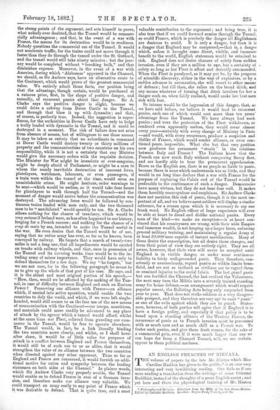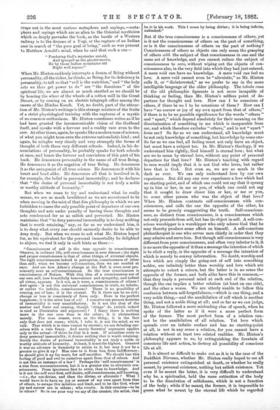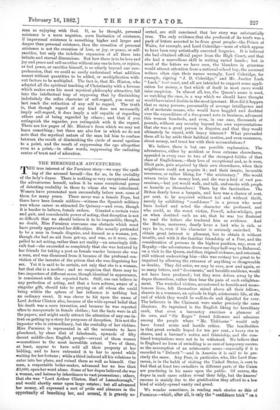AN ENGLISH PREACHER OF NIRVANA.
THE volume of papers by the late Mr. IIinton which Miss Caroline Haddon has given to the public,* is at once very interesting and very bewildering reading. One feels as if one were reading a translation from the writings of some Oriental Buddhist, instead of the thoughts of a great English aurist ; and yet here and there the physiological training of Mr. Hinton • Philosophy and Religion. Selections from the MSS. of the late James Hinton. Edited by Caroline Haddon, Leaden: iCegan Pan; Trench, Dad Co.
crops out in the most curious metaphors and sayings,—meta- pliers and sayings which are as alien to the Oriental mysticism which so deeply pervades the book, as the bustle of a Western railway is to the dreams of a Yogi, or the rapture of an Indian seer in search of "the pure goal of being," such as was present to Matthew Arnold's mind, when he said that such a one-
" Pondering God's mysteries untold, And tranquil as the glacier-snows,
He by those Indian mountains old Might well repose."
When Mr. Hinton suddenly interrupts a dream of Being without personality, all the richer, he thinks, as Being, for its deficiency in personality, to tell us that "evil is the nutrition," and "the holy acts we thus get power to do" are "the functions" of the spiritual life, we are almost as much startled as we should be by hearing the whirr of the wheels of a cotton mill in the Great Desert, or by coming on an electric telegraph office among the snows of the Hindoo Koosh. Yet, no doubt, part of the attrac- tion of Mr. Hinton's writings is this strange mixture of the fruits of a strict physiological training with the raptures of a mystic of no common enthusiasm. Mr. Hinton sometimes writes as if he had been granted the incommunicable vision of the Godhead itself, and speaks with a fervour and a reality rare even to the seer. At other times, again, he speaks like a modern man of science, of what you might term even the extreme rationalistic kind; and again, he mingles very closely and very strangely the forms of thought of both these very different schools. Indeed, in his de- nunciations of personality, he probably speaks for both schools at once, and hence the fervour and conviction of this part of his book. He denounces personality in the name of all true Being. He denounces it as the negation of true Being. He denounces it as the antagonist of all true science. He denounces it with his heart and head alike. He denounces all that is involved in it, for example, the belief in personal immortality; and he declares that "the desire of personal immortality is not truly a noble or worthy attitude of humanity."
But when we come to try and understand what he really means, we are as much bewildered as we are accustomed to be when moving in the mist of that dim philosophy in which we are forbidden to name the only possible point of departure of our own thoughts and acts under penalty of having those thoughts and acts condemned for us as selfish and perverted. Mr. Hinton maintains that "to deny personal immortality is to deny nothing that is worth retaining," nay, so far as we understand him, it is to deny what every one should earnestly desire to be able to deny truly. But when we come to ask what Mr. Hinton hoped for, as his equivalent for the personal immortality he delighted to abjure, we find it only in such hints as these :—
" Consciousness of self is the true opposite to consciousness. Observe, in ordinary life, self-consciousness is ever disease ; the right and proper consciousness is that of other things, of external objects. The right consciousness indeed is perception, consciousness of other than self; when we become self-conscious, then we are morbid at once. And see how Adam's change at the Fall is even most pro- minently seen as self-consciousness. So the true conacionness is consciousness of Nature. With this idea of a consciousness not of our own self, how beautifully benevolence and sympathy, and indeed all virtue, appears. Is it not, as it were, a consciousness of others ? And again : is not this universal consciousness, in truth, an infinite, or rather the infinite, consciousness ? There is no possibility of ceasing, nor of loss ; it is the eternal. To it there can be no evil ; change or loss is consciously of form only. Here is the perfect happiness ; it is the utter loss of self. I conceive our present doctrine of immortality is very unsatisfactory. Is it not like that of the matter and force not ceasing, though things' do (which indeed is used as illustration and argument) ? I fancy there is nothing more in the one case than in the other; it is abstractions merely. The man ceases, even as the thing; it is the fact only that does not cease; which, I take it, is not the mind, as we talk. That which is in time cannot be eternal ; we are deluding our- selves with a vain fancy. And surely Socrates' argument applies only to the actual—if there be that in a man. If actualism seem to deny personal immortality, it denies nothing that is worth retaining. Surely the desire of personal immortality is not truly a noble or worthy attitude of humanity. At least, it is not the highest. Granted it was an advance in humanity to attain to it, but may it not be a greater to give it up P Man rose to it from less, from indifference ; he should give it up for more, for self-sacrifice. We should lose this feeling of.good and evil to ourselves apart from that of others. And is not this an instance of a law ? Perhaps the self-consciousness' is a rise from unconsciousness, but it is a greater rise to altruistic con- sciousness. From ignorance first to error, then to knowledge. And is it not the self ever first, self-desire, self-conticionsness, self-knowing, —i.e., the not-divine, and then the divine, or altruistic ? What I would have is to have no joy or sorrow of my own apart from that of others, to escape this isolation and limit, and to be like God, whose joy and sorrow are in others ; who creates. Is this creation—to be in others ? So in our poor way we say of the creator, the artist, that
he is in his work. This I mean by being divine ; it is being infinite, unlimited."
But if the true consciousness is a consciousness of others, yet is it not the consciousness of others on the part of something, or is it the consciousness of others on the part of nothing ? Consciousness of others as objects can only mean the grasping of others with the subject of that consciousness in one and the same act of knowledge, and you cannot reduce the subject of consciousness to zero, without wiping out the objects of con- sciousness also, in the very field into which they had just entered. A mere void can have no knowledge. A mere void can feel no love. A mere void cannot even be "altruistic," as Mr. Hinton calls it, or "disinterested," as we prefer to say in the more intelligible language of the older 'philosophy. The tabula rasa of the old philosophic figments is not more incapable of thinking or feeling, than Mr. Hinton's selfless point of de- parture for thought and love. How can I be conscious of others, if there be no I to be conscious of them How can I have "no sorrow or joy of my own apart from that of others," if there is to be no possible significance for the words " others " and "apart," which depend absolutely for their meaning on the discrimination of something in me which is inseparable from me, and which therefore excludes "others," and is not " apart " from me? So far as we can understand, all knowledge must be not only knowledge of something, but knowledge by some one. So far as we can feel, all feeling must not only have an object, but must have a subject too. In Mr. Hinton's theology, if we understand him rightly, God himself is eternal love ; but what are we to mean by eternal love, without any point of personal departure for that love ? Mr. Hinton's teaching with regard to men would imply that it is not God who loves, but rather love that is God. But even so, we are as much in the dark as ever. We can only understand love by our own experience. But did any one ever experience a love which had no starting-point, and of which one could not say that it sprang up in him or her, in me or you, of which one could not say that it sought to draw closer him or her, or me or you, to some other person who was the object of that love? When Mr. Hinton contrasts self-consciousness with con- sciousness, and calls the one the opposite of the other, he seems to be grossly exaggerating the truth. Self-conscious- ness, as distinct from consciousness, is a consciousness which not only proceeds from self, but has its object in self. A self-con- scious worshipper is a worshipper who only adores God that he may thereby produce some effect on himself. A self-conscious philanthropist is one who serves men chiefly in order that they may admire and serve him. But though self-consciousness is very different from pure consciousness, and often very inferior to it, it is no more the opposite of it than a message the intention of which is to elicit a reply, is the opposite of a message the intention of which is merely to convey information. No doubt, worship and love which are simply the going-out of self into something nobler, are infinitely better than worship and love which are attempts to extort a return, but the latter is in no sense the opposite of the former, and both alike have this in common,— that they imply a personal mind at each end of the relation, though the one implies a better relation (at least on one side), and the other a worse. We are utterly unable to follow this confusion between self-forgetfulness,—which is one thing, and a very noble thing,—and the annihilation of self which is another thing, and not a noble thing at all; and so far as we can judge, Mr. Hinton followed a mere misleading clue of speech, when he spoke of the latter as if it were a more perfect form of the former. The most perfect form of a relation can- not be the annihilation of all relation. Yet love which spreads over an infinite surface and has no starting-point at all, is not in any sense a relation, for you cannot have a relation without at least two related realities. Mr. Hinton's philosophy appears to us, by extinguishing the fountain of conscious life and action, to destroy all possibility of conscious life at all.
It is almost as difficult to make out as it is in the case of the Buddhist Nirvana, whether Mr. Hinton really hoped to see all personal existence extinguished at death, or whether he really meant, by personal existence, nothing but selfish existence. Yet even if he meant the latter, it is very difficult to understand why he, a spiritualist, held the mere extinction of the body to be the dissolution of selfishness, which is not a function of the body; while if he meant the former, it is impossible to guess what he meant by the eternal life which he regarded man as enjoying with God. If, as he thought, personal existence is a mere negation, mere limitation of existence, if impersonal existence is something higher and larger and deeper than personal existence, then the cessation of personal existence is not the cessation of love, or joy, or peace, or self- sacrifice, but only the indefinite expansion of all these into infinite and eternal dimensions. But how there is to be love and joy and peace and self-sacrifice without any one to love, or rejoice, or feel peace, or sacrifice himself, is so utterly beyond our com- prehension, that we could as easily understand what addition meant without quantities to be added, or multiplication with- out factors to be multiplied. The fact is, that Mr. Hinton, who adopted all the spiritual teaching of Christianity with a fervour which makes even his most mystical philosophy attractive, fell into the intellectual trap of supposing that by diminishing indefinitely the reflex character of self-regard, you must at last reach the extinction of any self to regard. The truth is, that though regard of any kind does not necessarily imply self-regard, it does imply a self capable of regarding others and of being regarded by others ; and that if you extinguish the regarder, you extinguish with it the regard. There are few pages of Mr. Hinton's from which we may not learn something ; but there are also few in which we do not note that the mystical nature of the man led him to confuse between the result of diminishing the circle of moral egotism to a point, and the result of suppressing the ego altogether even as a point,—in other words, suppressing the radiating centre of trust and of adoration.




































 Previous page
Previous page